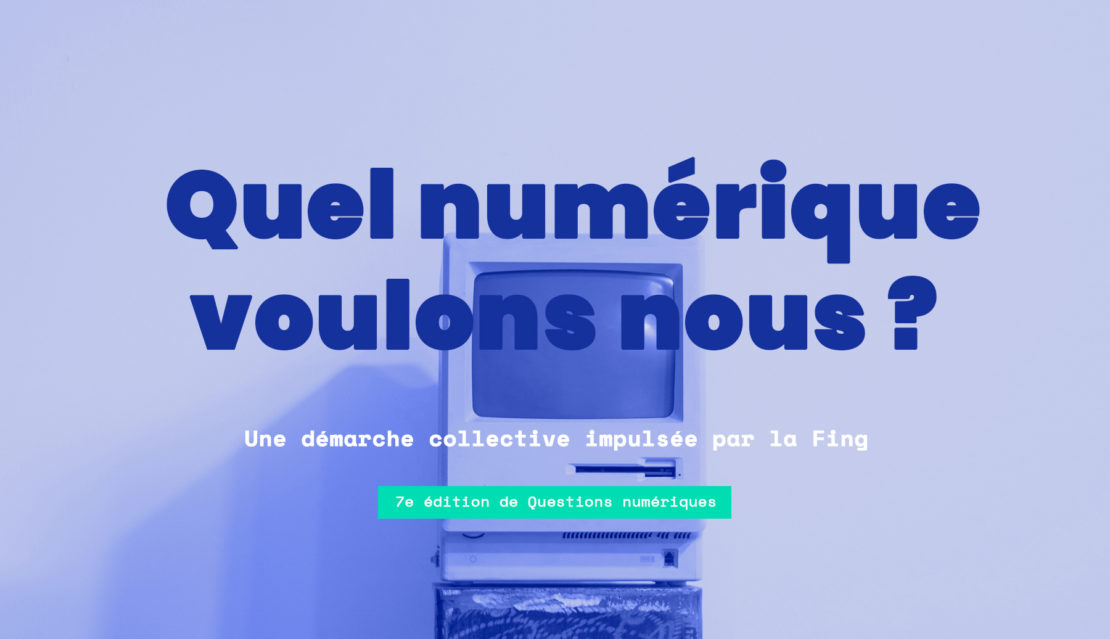In theAgenda for the ecological and digital futurethe FING had listed 20 challenges of the ecological transition. For each of them, it had deciphered the current contribution of digital technology and proposed " new 'paths' to engage a fairer contribution of digital technology to ecological issues".
In the Digital and Environment White Paper2018, the FING, the Institute for Sustainable Development and International Relations (Iddri), WWF France and GreenIT. fr, with the assistance of the National Digital Council (CNNum), had presented 26 proposals for action to public actors to put the transformative potential of digital at the service of the ecological transition. "This White Paper was intended to launch the debate on the most appropriate measures, to open a new political agenda: that of the convergence of transitions."
The Fing continues this reflection in the latest edition of Digital Questions 2018-2019: #Reset "What digital do we want for tomorrow?"
Published with the support of ADEME, Groupe La Poste, Orange, MAIF, the European Metropolis of Lille (MEL), Berger-Levrault, the 27th Region, the firm Vraiment Vraiment and Le BonCoin, this booklet " seeks to take advantage of foresight to give shape to a digital world that would offer "better" rather than "more".
A shared observation
This booklet aims at outlining a " shared observation": it is based on the observation made by many actors of the digital society, such as Tim Berners-Lee, the designer of the web (who believes that the web had failed in many respects, its increasing centralization leading to a "anti-human" phenomenon of great magnitude) or Tristan Harris, a former design ethicist at Google, who became one of the founders of the Center for Humane Technology...For the authors of the booklet, "today's digital technology is not adapted to tomorrow's world, to its uncertainties, to its limited resources. A decisive issue for the whole of society is that digital technology should move away from the "always more" approach and integrate long-term perspectives with the actors of society and future generations. (...) Today, these numerous subjects are compartmentalized in their thematic silos and treated in isolation by a small number of actors, against a backdrop of fatalism and resignation, or heroism, or wait-and-see attitude (expecting too much regulation by the authorities).
The path from a critical vision to a transformative vision is the central issue of #RESET: "The use of collective intelligence in all its forms is one of the support points. The other is the use of foresight, collective work on possible futures, and the development of paths for a desirable digital world.
Technical and thematic challenges
Through online exchanges, workshops and meetings, the participants in the "Reset" process have gathered a wealth of material in the form of a set of " technical challenges- Re-decentralize the web
- Taking care of the digital commons
- Designing a more sober yet desirable digital
- Make algorithms and AIs accountable and fair in practice
- Designing a digital environment that is more respectful of a mental ecology
- Ensure free and reliable information
- Building a framework for collective bargaining on personal data
- Putting digital technology at the service of fundamental data
- Guarantee social protection for all workers, regardless of their status
- Giving a status to work collectives outside the classical forms of
- salaried employment
- Share the value produced by platforms more equitably
- Digital technology that contributes positively to the human development of territories
- Moving towards an inclusive smart city
- Innovate differently
- A simplified and efficient job search
- Adopt a more open and transparent approach to recognition
- informal learning
- Towards a representative, feminist and empowering digital world for all gender identities
The 7 "qualities" of a desirable digital
The challenges are both thematic and technical, because digital devices are most often the result of non-technical choices: the strategic choices of the designers, the economic models, the underlying political and social choices.The challenges also raise the question of the relevant scale: " are these challenges that only global actors can address, or are they relevant to work on a 'micro' or 'meso' scale?"
Rather than settle this question, the authors of the booklet propose a set of "7 qualities of the digital we want":
- Inclusive: Digital technology that allows everyone to be a part of society, that promotes diversity rather than reproducing social inequalities and discrimination.
- Frugal: Energy and material efficient digital technology that promotes ecological transition rather than increasing emissions and depleting resources.
- Democratic: Digital technology that serves fundamental freedoms and democracy, and builds collective control of technical systems and platforms.
- Protective: Digital that defends freedoms, protects privacy, promotes trust and saves attention, rather than creating addiction and infobesity.
- Innovative: Digital that opens up innovation, frees it from the grip of dominant actors, facilitates social innovation, better integrates stakeholders and impacts.
- Capacitating: Digital that empowers humans, that develops the power to create and act, rather than alienate or subjugate.
- Equitable: A digital system that distributes economic value within society, that favors solidarity, rather than favoring the concentration of value and the destruction of social protections.
This booklet is the first brick in a process that will last 3 years.
Références :





